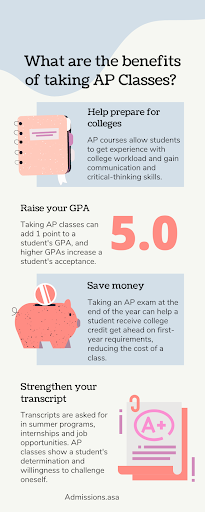Con: AP classes diminish students’ love of learning
May 7, 2022
The words “AP exams” ring throughout the school as teachers wrap up their final lessons and prepare their students for upcoming exams in May.
According to College Vine, advanced placement (AP) classes provide a semester’s worth of college-level curriculum, which includes subjects like foreign languages, sciences, math, social sciences and computer science. Students have the option to take their exam in May to potentially earn college credit depending on what their colleges accept. CHS offers 33 AP classes. While these courses challenge students with their abilities to handle rigorous content, they also create repercussions on students’ learning.
Taking these challenging classes can show colleges that students are ready to tackle tough curriculums at the post-secondary level. However, the decision that many students continue to make is that they lose their love of learning, according to research by The City of New York University.
Some students don’t take these AP classes because they necessarily like the subject, but rather to satisfy the unspoken requirements of taking a high number of AP classes. These classes have turned into a competition, where people just check it off their list to show their “superiority” when its true purpose should be to allow students to explore the subject in a meaningful way because they truly enjoy learning about it. While it is important to demonstrate to colleges that one is hardworking, students should also prioritize the type of AP classes they are taking and see if it fits within their interests and schedule.
Furthermore, according to Psychology Today, AP courses don’t teach critical thinking skills or allow students to be deeply involved with the information because of their emphasis on covering a large scope of the content. AP classes have drifted away from allowing students to learn interesting subjects and instead have become a race of memorization and practice for an exam.
Additionally, AP classes take a toll on students’ mental health. Research by Psychology Today finds that there were high rates of anxiety, depression and suicide in high-achieving schools that place an emphasis on AP classes. The stress of taking many APs and performing well in these demanding classes have increased distress and tension in students who are attempting to bite off more than they can chew. Students are piling on numerous AP classes, resulting in skyrocketing burnout rates and affecting their social and emotional wellbeing.
A major misconception is that if a student takes AP courses in high school, they do well in college and if they don’t, then they won’t do well. According to research done by Challenge Success, while those who have taken AP classes in high school do well in college and those who do not take that many, or even none, still do well in college.
Although AP classes have their benefits, such as providing opportunities for students to prepare for college classes and potentially giving them college credit, one must look into the drawbacks of the AP course they plan to take and understand whether these courses will truly help them achieve their academic and personal goals or rather, hinder them and diminish their wellbeing.




